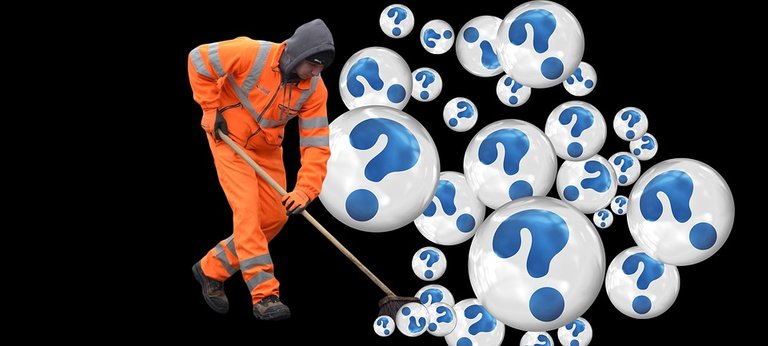A wonderful good evening dear Steemians !!!
Today a very interesting topic: garbage in numbers.

Source: pixabay
0 percent of waste is recycled in Bulgaria.
In these EU countries, the recycling rate is less than 20%: France, Latvia, Estonia, Lithuania and Greece.
33% of the supposed grains of sand on the British beaches are in fact small plastic parts. Mussels also eat plastic particles - and then we eat the mussels.
1% is the recycling rate of rare earths in Germany.
1.3 billion tons of food annually spoil around the world, which equates to one-third of the total.
2.16 Euro can be earned by collecting returnable bottles in Germany per hour. That has resulted in a self-experiment.
6 times more plastic than animal plankton swims in the Pacific.
25 million ziger filter were found in the Pacific.
30 million tons of garbage were spilled into Japanese cities during the Fukushima earthquake. Almost everything was recycled.
1000 tons of rock is needed to extract one ton of copper. Or you can simply recycle 14 tons of electronic waste.
600,000 tons of electronic waste are produced every year in Germany. Less than half is recycled there as well.
 for more exciting Life HACKS, information about Recycling and What the Facts follow me:
for more exciting Life HACKS, information about Recycling and What the Facts follow me:
Vote / Follow / Resteem @leranion
You want a Crypro-Wallet? --> https://www.coinbase.com/join/5a2ba1c08f092300e5e862da
Follow me on Discord: https://discord.gg/RSFdbQ
maybe I can get you rethinking
Regards,
@Leranion
Einen wundervollen guten Abend, liebe Steemianer !!!
Heute ein sehr interessantes Thema: Müll in Zahlen.

Quelle: pixabay
0 Prozent Abfall wird in Bulgarien recycelt.
In diesen EU-Ländern beträgt die Recyclingquote weniger als 20%: Frankreich, Lettland, Estland, Litauen und Griechenland.
33% der vermeintlichen Sandkörner an den britischen Stränden sind in Wirklichkeit kleine Plastikteile. Muscheln essen auch Plastikpartikel - und dann essen wir die Muscheln.
1% ist die Recyclingrate von Seltenen Erden in Deutschland.
1,3 Milliarden Tonnen Lebensmittel werden jährlich in der ganzen Welt verderben, was einem Drittel der Gesamtmenge entspricht.
2,16 Euro können durch das Sammeln von Spenden in Deutschland pro Stunde verdient werden. Das hat zu einem Selbstversuch geführt.
6 mal mehr Plastik als Tierplankton schwimmt im Pazifik.
25 Millionen Zigerettenfilter Forscher in einer Meeres-Studie entdeckt.
30 Millionen Tonnen Müll wurden während des Erdbebens in Fukushima in japanische Städte verschüttet. Fast alles wurde recycelt.
1000 Tonnen Gestein werden benötigt, um eine Tonne Kupfer zu gewinnen. Oder Sie recyceln einfach 14 Tonnen Elektroschrott.
600.000 Tonnen Elektroschrott werden jährlich in Deutschland produziert. Weniger als die Hälfte wird dort ebenfalls recycelt.
 for more exciting Life HACKS, information about Recycling and What the Facts follow me:
for more exciting Life HACKS, information about Recycling and What the Facts follow me:
Vote / Follow / Resteem @leranion
You want a Crypro-Wallet? --> https://www.coinbase.com/join/5a2ba1c08f092300e5e862da
Follow me on Discord: https://discord.gg/RSFdbQ
maybe I can get you rethinking
Regards,
@Leranion
0.69% @pushup from @leranion
You got a 9.01% upvote from @mercurybot courtesy of @re-steemer!
You got a 8.48% upvote from @votebuster courtesy of @re-steemer!
Gran post Amigo:) Saludos.!
Sneaky Ninja Attack! You have been defended with a 0.61% vote... I was summoned by @re-steemer! I have done their bidding and now I will vanish...Whoosh
Vote,follow &comment Like I do
Done :)
Another great post! This brings up another book that I recommend called: "Garbology" by Edward Humes (https://www.penguinrandomhouse.com/books/309588/garbology-by-edward-humes/9781583335239). It summarizese the history of trash collection and gives an incredibly insightful look into the way that we handle our 21st century waste. Going back to Roman times, the corruption that brought the production of Landfills to the United States, and many other interesting things. It would speak of how we used to let pigs wander the streets to eat garbage strewn around - because we used to do an even more horrendous job of our waste management. /_/ shame
What I think will be fundamentally interesting is closing the manufacturing loop using 3D printing technologies. We have machines that are already recycling plastic into filaments. If we were to put a 3D printer in every school and teach children to recycle plastic using a filament maker, then we could teach a generation of children how to save their future. That and just lower levels of consumption overall.
Br pae lote ya lote ya
#a yet ta mr thitsr